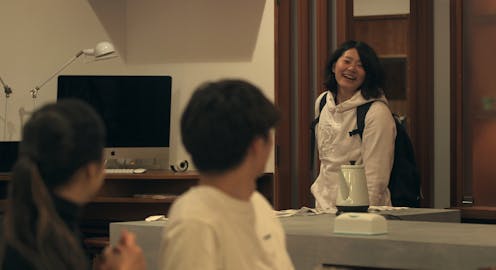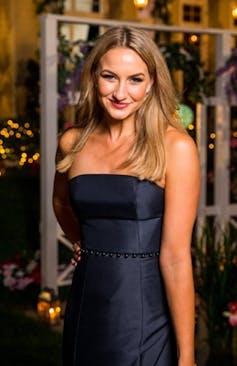
Often when we think about reality TV, we think about mess, conflict and scandal – three things usually grouped under the umbrella term of “drama”.
Sometimes the drama comes organically. For instance, shows with social strategy games such as Survivor have conflict built into their architecture.
Other times, the drama is engendered by a show’s producers, as they manipulate contestants and narratives during and after filming – often causing great harm.
The good news is there are plenty of shows that don’t do this.
The villain edit
Reality shows are often presented in terms of heroes and villains. Indeed, Rolling Stone went as far as to declare 2023 “the year of the reality TV villain”.
This so-called villainy is a subject we’re both familiar with. One of us, Jodi, has written about it extensively, authoring a novel starring a producer and villain on a show much like The Bachelor. The other, Rebecca, has lived the experience. Rebecca appeared on The Bachelor New Zealand in 2016, and her PhD studies on reality TV were manipulated into a narrative of ‘undercover spy’.
There are many ways to become a reality TV villain, but not all are deserved. The “villain edit” – which is also the title of a memoir by ex-Bachelor Australia contestant Alisha Aitken-Radburn – refers to the (often undeserved) presentation of certain contestants as the “bad guys”.

Several reality stars have shared their experience of being used as human props in these social experiments.
Last month, ex-Married at First Sight contestant Olivia Frazer came forward with her story of being type-cast as a villain. For her, the result was widespread harassment, suicidal thoughts and panic attacks.
Even contestants who don’t get the full villain treatment can suffer devastating effects from appearing on reality TV.
Bethenny Frankel, an original cast member of The Real Housewives of New York City, has become an advocate for protecting reality TV stars. Similarly, former Love Is Blind stars Nick Thompson and Jeremy Hartwell have founded the Unscripted Cast Advocacy Network which supports past, current and future cast members and pushes for more ethical production.
A cosy alternative
Even if 2023 was the year of the villain, there are many reality shows that focus not on conflict, but on cooperation and compassion. The turn towards “cosy” reality TV has spread across many different formats of the genre, alongside a rise in cosy games and cosy fiction.
Here’s our list of lesser-known cosy reality TV gems you can watch if you want to pause the drama. (For more popular picks, try here and here.)
1. The Casketeers
The Casketeers is a docuseries set in a funeral home in Aotearoa/New Zealand. While the topic of death may not seem cosy, the day-to-day experiences of the family-run Tipene Funerals peacefully navigates poignant situations alongside moments of levity.
The customs and protocols of both death and Indigenous cultures are honoured through Francis and Kaiora Tipene’s explanations of certain traditions for the dead – and any drama is understandable and restrained. We also get answers to many pressing questions, such as how Francis plans to pimp out the company hearse.
2. L’Agence/The Parisian Agency
The luxury real estate reality show is an established sub-genre. Generally these formats offer, as one Time article explains, “glittering escapism with just enough personal drama to temper the opulence”. This is an accurate description of the most famous example, Selling Sunset, in which luxury properties take a back seat to employees’ personal lives.
L’Agence, or The Parisian Agency, is a wonderfully cosy take on the form. It follows the Kretz family (father, mother, four sons and grandmother) who run an independent luxury real estate firm in Boulogne.
While the properties, both in France and further abroad, are stunning (and stunningly priced), the real star is the warm family dynamic. In the first episode, for instance, several of the brothers briefly set aside work to help their grandmother write an online dating profile.
3. What the Love!
This one-season Indian reality TV show falls into what could be described as the “makeover” sub-genre, typified by Queer Eye, in which one or more (usually famous) people team up to help participants improve their lives.
The makeover isn’t designed to appeal to external gazes. Rather, its purpose is to help participants find their self-confidence and overcome internal obstacles that might be holding them back.
What the Love! is hosted by famous Bollywood filmmaker Karan Johar. In partnership with a rotating cast of Indian celebrities, he helps six single people reach a place where they’re ready to find love: not by making them more societally palatable, but by helping them highlight what is most lovable about themselves.
The show also provides important commentary on social issues – such as the status of LGBTQ+ rights in India – and genuinely heartwarming endings.
4. Match Fit
Match Fit is another spin on the makeover format, focusing on a niche pool of ex-national New Zealand sporting representatives. Now middle-aged, following a “15 year off-season”, these former rugby legends undergo a 15-week training regime before competing against a similarly-matched Australian squad.
The participants are given space to share how and why they may no longer be match fit; if there is a villain here, it is time.
They also reflect on their past sporting successes. How do you describe the feeling of putting on the black jersey? The pressure when stakes are high? The moment you realise you’re no longer at your peak?
Themes of failure and redemption may sound intense, but sometimes cosiness comes from just having a yarn about the good old days.
5. Ai no Sato/Love Village
No country has mastered wholesome reality TV better than Japan.
While Terrace House (once described in The Guardian as “the must-watch Japanese reality show where nothing happens”) is probably the most famous example, there are plenty of others, such as Old Enough – which focuses on young children undertaking their first solo errands – and Ainori (Love Wagon), a reboot of a stalwart Japanese reality dating franchise.
Ai no Sato (Love Village) is to Ainori what The Golden Bachelor is to The Bachelor. It has an older cast than its parent show (35 to 60 instead of twenty-somethings). Rather than travelling the world, the contestants work together to renovate an old house in rural Japan.
On the surface it may sound gimmicky. For instance, when a participant is ready to confess their love, they must climb a hill and ring a pink “love bell”. But the romantic narratives are tearjerking and heartwarming in equal measure.
6. Bake Squad
It would be impossible to not include a competitive baking show on this list, since this sub-genre arguably gave rise to all other cosy reality TV. And while there are many shows we could nominate here, the one we’ve selected is in some ways the apotheosis of the form.
While Bake Squad is technically a competitive show, it’s also a cooperative one. Each week the same four pastry chefs compete to make a dessert for a different client’s special day. Someone always wins, but no one gets eliminated. And at the end of each episode there’s a cake-filled celebration.
7. The Great British Sewing Bee
Like its baking brother, The Great British Sewing Bee is a competition for experts – the hours of experience required to qualify can’t be faked. But unlike similar skill-based shows such as Blown Away or Forged in Fire, this one makes the art in question seem achievable for all.
The show centres on a lovely group of amateur sewists who work their hardest to meet a brief. Although a contestant gets eliminated each week, nerves are settled with tea and scones out on a blisteringly cold balcony while the judges deliberate.
And don’t worry, there’s definitely drama. Those misaligned button holes will have you going, “oh, darn!”
Rebecca was a participant on season two of The Bachelor NZ in 2016, produced by Warner Bros International Television NZ.
Jodi is the author of three romantic comedies set on reality television, which are published by Simon & Schuster Australia.
This article was originally published on The Conversation. Read the original article.







